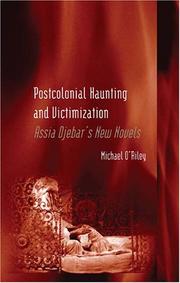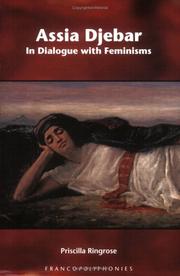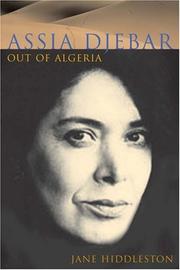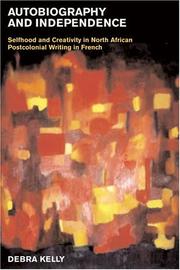| Listing 1 - 10 of 16 | << page >> |
Sort by
|
Book
ISBN: 9071946045 Year: 1988 Publisher: Eindhoven Uitgeverij Zenobia
Abstract | Keywords | Export | Availability | Bookmark
 Loading...
Loading...Choose an application
- Reference Manager
- EndNote
- RefWorks (Direct export to RefWorks)
Book
ISBN: 9782878544879 2878544870 Year: 2010 Publisher: Paris Presses Sorbonne nouvelle
Abstract | Keywords | Export | Availability | Bookmark
 Loading...
Loading...Choose an application
- Reference Manager
- EndNote
- RefWorks (Direct export to RefWorks)
Djebar, Assia --- Djebar, Assia, --- Djebbar, Assia, --- Jabbār, Āsiyā, --- Imalhayene, Fatma-Zohra, --- Criticism and interpretation

ISBN: 9780820495361 Year: 2007 Publisher: New York, N. Y. Peter Lang
Abstract | Keywords | Export | Availability | Bookmark
 Loading...
Loading...Choose an application
- Reference Manager
- EndNote
- RefWorks (Direct export to RefWorks)
Postcolonialism in literature --- Djebar, Assia, --- Djebbar, Assia, --- Jabbār, Āsiyā, --- Criticism and interpretation. --- Imalhayene, Fatma-Zohra,
Book
ISBN: 9053830200 Year: 1991 Publisher: Amsterdam VU Uitgeverij
Abstract | Keywords | Export | Availability | Bookmark
 Loading...
Loading...Choose an application
- Reference Manager
- EndNote
- RefWorks (Direct export to RefWorks)
channeling --- Seth --- Armerus --- Ramala --- spiritistische groeperingen in Nederland --- Zohra --- de psychosofie --- Christus --- wereldreligie --- Jehovah's Getuigen --- bloedtransfusie
Book
ISBN: 9066470259 Year: 1988 Publisher: Enschede Stichting UItgeverij Anubis
Abstract | Keywords | Export | Availability | Bookmark
 Loading...
Loading...Choose an application
- Reference Manager
- EndNote
- RefWorks (Direct export to RefWorks)
psychosofie --- de menselijke evolutie --- bewustwording --- het individu en de mensheid --- Zohra --- medium --- middelaar --- inkarnatie van de Zoon Gods --- Orde voor Universele Broederschap

ISBN: 9401201803 1423790960 9781423790969 9789401201803 9042017392 9789042017399 Year: 2006 Publisher: Amsterdam Rodopi
Abstract | Keywords | Export | Availability | Bookmark
 Loading...
Loading...Choose an application
- Reference Manager
- EndNote
- RefWorks (Direct export to RefWorks)
What are the political implications of an Arab feminist writing practice? How do the works of Assia Djebar, Algeria's internationally acclaimed francophone writer, relate to the priorities and perspectives of both Western and Arab feminist politics? Does Djebar succeed in her aim of reclaiming the history of her homeland, and of her religion, Islam, for women? Or in reclaiming the sexuality of Arab women? In Assia Djebar: In Dialogue with Feminisms , Priscilla Ringrose uncovers the mechanisms of Djebar's revisionary feminism and examines the echoes and dissonances between what Djebar terms her "own kind of feminism" and the thinking of French and Arab feminists such as Irigaray, Cixous, Kristeva, Mernissi and Ahmed. Arguing that Djebar's work is in constant dialogue with other feminisms, Ringrose assesses the strengths and weaknesses of its ideals and identifies their own particular intervention into current political and cultural debates. This book will appeal not only to scholars working on Djebar, but also to students of colonial history, women's studies and cultural politics.
Feminism and literature. --- Feminism in literature. --- Muslim women in literature. --- Women in literature. --- Woman (Christian theology) in literature --- Women in drama --- Women in poetry --- Feminist theory in literature --- Literature --- Women authors --- Djebar, Assia, --- Jabbār, Āsiyā --- Djebar, Assia --- Djebar, A. --- Imalhayene, Fatma-Zohra --- Criticism and interpretation. --- Djebbar, Assia, --- Jabbār, Āsiyā, --- Imalhayene, Fatma-Zohra, --- Literature and feminism

ISBN: 1786945347 1846312604 9781846312601 1846316855 9781846316852 1846310318 9781846310317 9781846310237 9781786945341 1429827017 1846310237 9781846310232 Year: 2006 Publisher: Liverpool Liverpool University Press
Abstract | Keywords | Export | Availability | Bookmark
 Loading...
Loading...Choose an application
- Reference Manager
- EndNote
- RefWorks (Direct export to RefWorks)
For more than fifty years, Assia Djebar, Silver Chair of French at New York University and winner of the Neustadt Prize for Contribution to World Literature, has used the tools of poetry, fiction, drama and film to vividly portray the world of Muslim women in all its complexity. In the process, she has become one of the most important figures in North African literature. In Assia Djebar, Jane Hiddleston traces Djebars development as a writer against the backdrop of North Africas tumultuous history. Whereas Djebars early writings were largely an attempt to delineate clearly the experience of being a woman, an intellectual, and an Algerian embedded in that often violent history, she has in her more recent work evinced a growing sense that the influence of French culture on Algerian letters may make such a project impossible. The first book-length study of this significant writer, Assia Djebar will be of tremendous interest to anyone studying post-colonial literature, womens studies or Francophone culture.
Languages & Literatures --- Romance Literatures --- French Literature --- Middle Eastern Languages & Literatures --- Djebar, Assia, --- Jabbār, Āsiyā --- Djebar, Assia --- Djebar, A. --- Imalhayene, Fatma-Zohra --- Criticism and interpretation. --- Algeria --- In literature. --- Algerians in literature. --- Algerian literature (French) --- Women authors --- History and criticism.
Book
ISBN: 0231539878 9780231539876 9780231172561 0231172567 Year: 2015 Publisher: New York, NY
Abstract | Keywords | Export | Availability | Bookmark
 Loading...
Loading...Choose an application
- Reference Manager
- EndNote
- RefWorks (Direct export to RefWorks)
Born and raised in French Algeria, Assia Djebar and Hélène Cixous represent in their literary works signs of conflict and enmity, drawing on discordant histories so as to reappraise the political on the very basis of dissensus.In a rare comparison of these authors' writings, Algerian Imprints shows how Cixous and Djebar consistently reclaim for ethical and political purposes the demarcations and dislocations emphasized in their fictions. Their works affirm the chance for thinking afforded by marginalization and exclusion and delineate political ways of preserving a space for difference informed by expropriation and nonbelonging. Cixous's inquiry is steeped in her formative encounter with the grudging integration of the Jews in French Algeria, while Djebar's narratives concern the colonial separation of "French" and "Arab," self and other. Yet both authors elaborate strategies to address inequality and injustice without resorting to tropes of victimization, challenging and transforming the understanding of the history and legacy of colonized space.
Women and literature --- Politics and literature --- Literature --- Literature and politics --- Political aspects --- Djebar, Assia, --- Cixous, Hélène, --- Jabbār, Āsiyā --- Djebar, Assia --- Djebar, A. --- Imalhayene, Fatma-Zohra --- Criticism and interpretation. --- Cixous, Hélène

ISBN: 1781386161 1846312620 9781846312625 0853236593 9780853236597 9781781386163 Year: 2005 Publisher: Liverpool Liverpool University Press
Abstract | Keywords | Export | Availability | Bookmark
 Loading...
Loading...Choose an application
- Reference Manager
- EndNote
- RefWorks (Direct export to RefWorks)
This book offers an in-depth study of the autobiographical writings of four twentieth-century writers from North Africa, Assia Djebar, Mouloud Feraoun, Abdelkébir Khatibi and Albert Memmi, as they explore issues of language, identity and the individual's relationship to history. The book places these writers in a clearly defined theoretical context, introducing and contextualising each of the four through the application of postcolonial studies and literary theory on autobiography linked to close textual reading of their works. Avoiding both psychoanalytical theory and approaches concerned primarily with the writer's 'testimony value', Kelly concentrates instead on the poetic and literary qualities of each author's work, dwelling on the politics and poetics of identity, as well as the ethics and aesthetics of this literature. She includes clear discussions of key terms such as 'postcolonial', 'Francophone', and 'autobiography', which current academic discourse has rendered very complex and even opaque. The book includes a fascinating photograph of two stone tablets inscribed with Punic and Numidian scripts, now held in the British Museum, which Assia Djebar writes about at length in one of the texts studied in the book.
North African literature (French) --- Identity (Psychology) in literature. --- History and criticism. --- Feraoun, Mouloud --- Djebar, Assia, --- Memmi, Albert --- Khatibi, Abdelkebir, --- ʻAbd al-Kabīr al-Khaṭībī, --- ʻAbd al-Kabīr Khaṭībī, --- Abdelkebir Khatibi, --- Khaṭībī, ʻAbd al-Kabīr, --- Khatibi, Abdelkabir, --- خطيبي، عبد الكبير --- خطيبي، عبد الكبير، --- عبد الكبير الخطيبي --- ממי, אלבר --- Memi, Alber --- Djebbar, Assia, --- Jabbār, Āsiyā, --- Imalhayene, Fatma-Zohra, --- Firʻawn, Mawlūd --- فرعون، مولود --- مولود فرعون --- Criticism and interpretation. --- Khatibi, Abdelkbir, --- Jabbār, Āsiyā --- Djebar, Assia --- Djebar, A. --- Imalhayene, Fatma-Zohra
Book
ISBN: 2706819073 Year: 2005 Publisher: Paris Maisonneuve & Larose
Abstract | Keywords | Export | Availability | Bookmark
 Loading...
Loading...Choose an application
- Reference Manager
- EndNote
- RefWorks (Direct export to RefWorks)
Djebar, Assia --- North African literature --- Littérature maghrébine --- History and criticism --- Histoire et critique --- Djebar, Assia, --- Criticism and interpretation --- 840 "19" DJEBAR, ASSIA --- Franse literatuur--20e eeuw. Periode 1900-1999--DJEBAR, ASSIA --- 840 "19" DJEBAR, ASSIA Franse literatuur--20e eeuw. Periode 1900-1999--DJEBAR, ASSIA --- Littérature maghrébine --- Djebbar, Assia, --- Jabbār, Āsiyā, --- Imalhayene, Fatma-Zohra, --- History and criticism. --- Criticism and interpretation.
| Listing 1 - 10 of 16 | << page >> |
Sort by
|

 Search
Search Feedback
Feedback About UniCat
About UniCat  Help
Help News
News